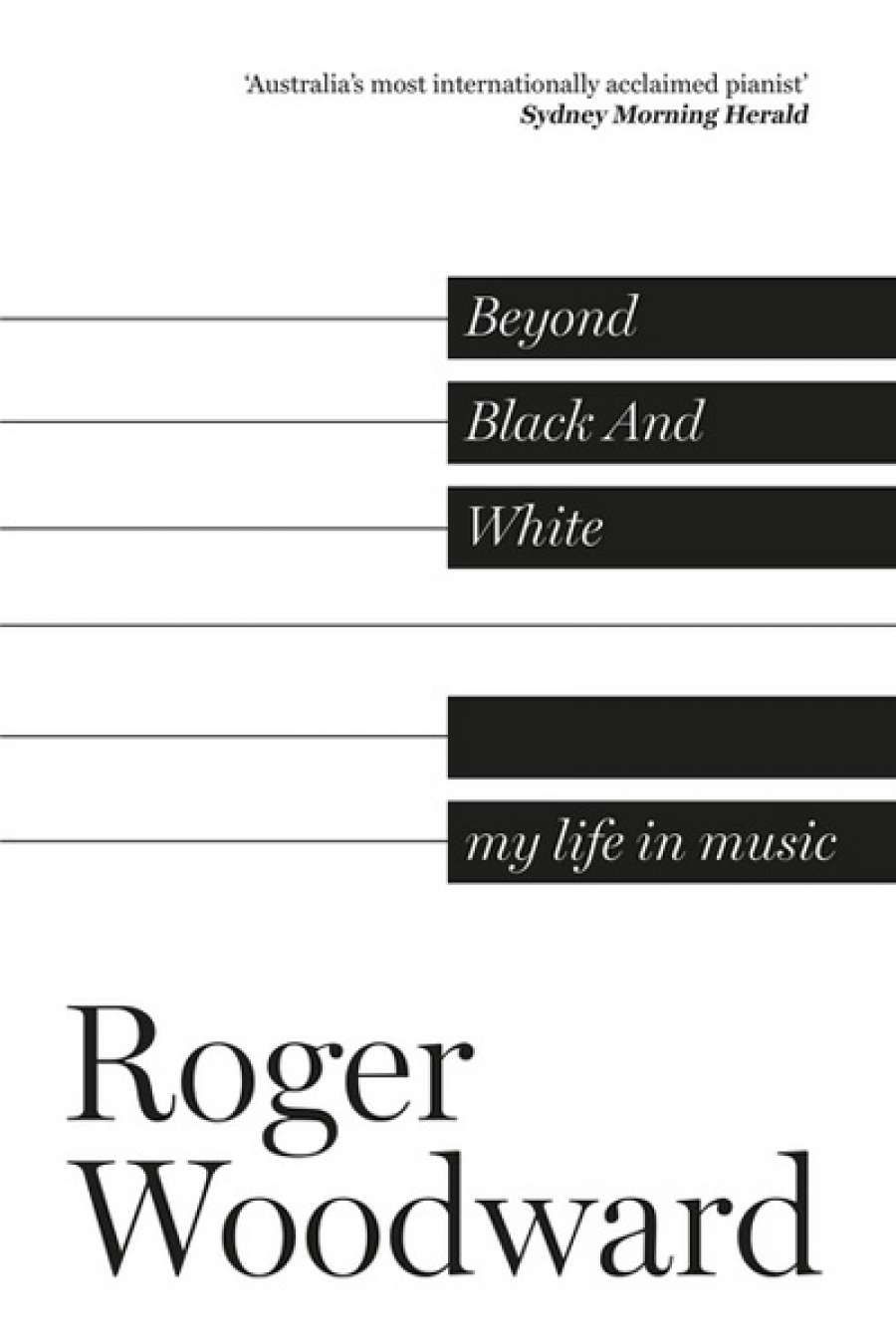
- Free Article: No
- Contents Category: Memoirs
- Custom Article Title: Valerie Lawson reviews 'Beyond Black and White' by Roger Woodward
- Review Article: Yes
- Online Only: No
- Custom Highlight Text:
There are two Roger Woodwards in Beyond Black and White. One vividly brings to life his early years as an imaginative and highly talented boy whose future was determined when, at the age of seven, he first heard the music of Bach. The second presents the adult Woodward, whose memoirs relate in punctilious detail his fifty-year career as an acclaimed pianist.
It may seem contradictory for a man declared a ‘pianistic genius’ and ‘the greatest living performer of contemporary music’ (both accolades are on the book’s back cover), but Woodward’s recollections of his childhood in Sydney form by far the most lively and entertaining chapters in the book. His encounters with illustrious composers, conductors, and musicians often read like formal reports. Woodward’s inner life as an adult is overshadowed by minutiae and long lists – of people, places, musical scores, performances – so many in fact (one comprises forty-five consecutive names in a single paragraph) that they impede the narrative.
- Book 1 Title: Beyond Black and White
- Book 1 Subtitle: My life in music
- Book 1 Biblio: ABC Books, $59.99 hb, 609 pp
The publisher describes the book as ‘part memoir, part manifesto’, a label that reveals its uncertain structure, which hovers between the author’s early life, his years studying in Poland during the Cold War, his career performing in Europe and the United States, and a disconnected Part II that recalls his memories of eight composers, among them John Cage.
The heroine of the book is Woodward’s first teacher, Winifred Pope, a devout Christian who lived in Chatswood, Sydney, where Woodward grew up. He conjures up the sounds, the scents, and the comfort of Miss Pope’s living room in his description of the metronome and jellybeans on top of her piano, the copy of Caspar David Friedrich’s painting Wanderer above the Sea of Fog hanging on the wall, the way she explained that music was an art practised for centuries in the service of God, and how those days marked the beginning of his reliance on Bach as a sanctuary and his true ‘homeland’.
Woodward’s years as a student at the Sydney Conservatorium introduce the rebellious student who was suspended for bad behaviour and who once felt like strangling the principal of the Con High School, nicknamed Midget, ‘with his bare hands’. There are anecdotal jewels in these early years, among them Woodward’s elation at watching Johnny O’Keefe, who became an inspiration for Woodward’s brief career in a pop group called the Yaks (he groomed his hair in the style of the Everly Brothers). He also writes with insight and empathy about the downfall of conductor and composer Eugene Goossens.
Woodward’s years as a student in Poland from the mid-1960s represent a focal point of the book, one that unites music with politics. He describes the years from 1939 to 1944 when the Third Reich so feared the power of the music of Chopin that it was a crime punishable by execution to play his music in Poland (‘forbidden melodies stirred people’s souls’). Poland had a profound impact on Woodward. The ‘manifesto’ element of his book revolves around his life in Poland, the politics of the time, his commitment to the Polish trade union movement, Solidarity, and how his connections brought him to the attention of the KGB.
Chopin pervades Woodward’s memoir and leads him to the home of Arthur Hedley, the musicologist, scholar, and biographer whose collection included original Chopin manuscripts inherited from the family of George Sand, a diamond ring given to Chopin by TsarAlexander I, and a pencil with which Chopin made his corrections. Woodward describes this visit as vividly as he does his life in Brixton, London, where he lived from 1978. He witnessed the Brixton riots of 1981 and became a foster parent of teenager Elroy Palmer, who was then in serious trouble with the police. Woodward later adopted Palmer, who grew up to make his father proud of his achievements working for the St Giles SOS Young Offenders management team.
On the whole, Beyond Black and White does not go beyond the barrier that separates the professional from the personal. There is little about Woodward’s turbulent relationship with Prudence Page, the mother of their daughter, Asmira, and only snippets about Trish Ludgate, his wife and the mother of their son, Ben. He admits to being a selfish father to Asmira, with whom he says he became ‘involved in a hurtful conversation and gave an unmeasured reply to ... when I should have remained calm, and provided much needed reassurance’. He makes a public apology: ‘I humbly ask her forgiveness.’
Woodward now lives in the United States where he is a member of the faculty of San Francisco State University. Although Beyond Black and White is published in Australia, the text uses American spellings, suggesting that an American edition is imminent.
The final chapter, called ‘Little Masterclass’, is addressed directly to pianists and begins: ‘Good morning everyone. I will begin with a consideration of piano technique through primary hand positions … ’ Woodward is back in his homeland, the sanctuary of Miss Pope, the security of doing what he does very well. Beyond Black and White is a book for musicians and students of music, but those who are seeking the ‘deeply personal’ story promised by ABC Books’ marketing team must look elsewhere.


Comments powered by CComment